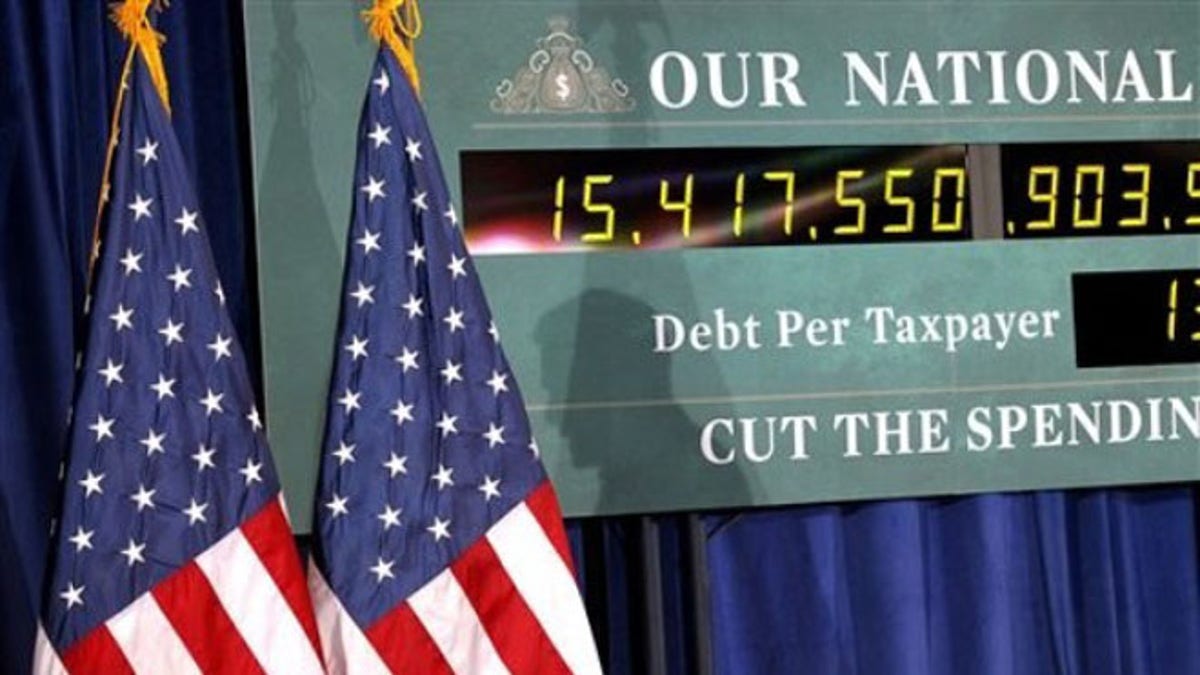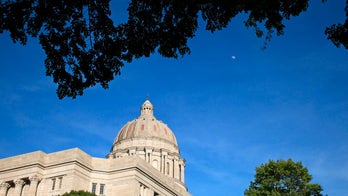
Feb. 24, 2012: A national debt clock is shown during a campaign event for Mitt Romney in Kalamazoo, Mich. (AP)
What is the real cost of the U.S. government's nearly $16 trillion debt?
"The debt crisis is likely bigger than you think," a new report issued last week by Deloitte, one of the world's largest accounting firms, concluded.
That's because interest payments add a whole new level of fiscal pain to the country's debt problem. Interest payments on the national debt alone, it noted, are expected to total some $4.2 trillion over the next decade.
And that number could fluctuate depending on rates.
[pullquote]
The lead author of the Deloitte study, director Bill Eggers, stressed the way that U.S. government debt could quickly spiral out of control if investors become less willing to lend more money.
"If interest rates go up by simply 3 percent over the next decade, the additional cost to the Treasury, just for interest payments, would equal the peak combined cost of the wars in both Afghanistan in Iraq," he said.
So what could $4.2 trillion buy instead?
Deloitte, an accounting and consulting firm that often audits government finances, says it's enough to do all of the following:
- build 80,000 miles of highways
- pay tuition for every science/math/engineering college degree in the country
- triple U.S. government general R&D funding
- build six international space stations
- offset 80 percent of global warming pollution in the atmosphere as recommended by the Intergovernmental Panel on Climate Change
The report notes that the $4.2 trillion could also be given back in the form of tax cuts.
Not all economists are on board with the implications of the study.
"The major holders of government bonds are agencies and individuals within the U.S.," Robert Stonebraker, an economics professor at Winthrop University, told FoxNews.com.
"So if you pay $1 trillion in interest on the debt, a lot of it will go back to Americans anyway."
But Eggers noted that a lot of the interest payments do go overseas.
"If you look at the interest payments going to foreign countries, soon we're going to be spending enough to essentially finance the Chinese military," he said.
Currently, foreigners own some $5 trillion in U.S. government bonds, $1 trillion of which is owned by China.
Some criticized the report's ideas.
"I think they're overhyping the need to fix the debit crisis in short run," Stonebraker said.
"If the economy recovers, a lot of the debt will go away automatically. There wouldn't be as much need for unemployment benefits, food stamps, Medicaid -- so a significant part of the spending would go away, and debt growth would slow on its own."
Stonebraker agreed with the Deloitte report that debt will eventually need to be dealt with, but said he disagreed on the timing.
"It's not appropriate to cut spending during an economic slowdown -- that is exactly when you need deficit spending to stimulate the economy and get people back to work."
Other analysts say that the deficit should be brought under control quickly, and cite European countries that are cutting budgets as an example.
"There are a whole set of economists who think that we need to bite the bullet and start making cuts now, essentially what the U.K. government is doing now," Eggers said.
"The debt is not something that is going to go away the more time that goes by."




